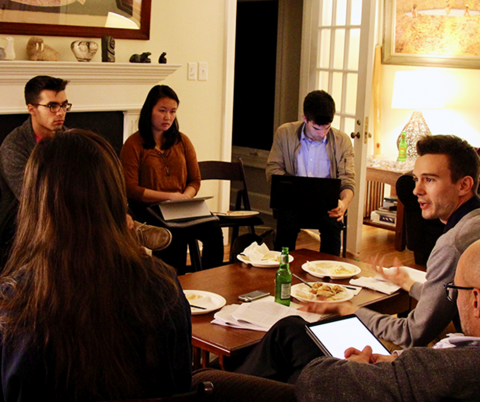How to Ask Questions (2017-2018)
In current culture, people usually discuss controversial moral and political issues only among like-minded people who do not press challenging questions. In fact, calling on people to justify their moral, political and religious views, especially in contexts where others might disagree, is widely regarded as impolite, even insulting.
However, evidence suggests that people who are regularly called upon to answer the right kinds of questions will exhibit greater intellectual humility and will be more likely to participate constructively in public discussions.
This project team identified a range of questions about effects of and reasons for policies as well as about causes of one’s beliefs in order to investigate which of these questions increase humility and which raise barriers to constructive discourse, such as defensiveness, rationalization and polarization.
The team’s goal was to test the hypothesis that, if students are trained in a culture that encourages people to regularly ask themselves and others the right questions, then they will become better at understanding their own or others’ points of view and, hence, at navigating an ideologically diverse world.
Team members mapped out the various kinds of questions, drawing on philosophical work on argumentation, justification, reasoning and rationalization. They then used surveys and questionnaires to examine how asking various kinds of questions affects people’s confidence in and commitment to their own views as well as their attitudes toward others who disagree.
The team use MTurk to reach a large and diverse population as well as in-person surveys on campus and in the community (including at the North Carolina state fair) to provide confirmation of results and develop a battery of questions through which people can learn to engage thoughtfully and critically with diverse perspectives.
Team members also visited the Right Questions Institute, consulted with the SAGE Center for the Study of Mind and attende the Humility & Conviction in Public Life conference in Hartford, CT, in April 2018.
Timing
Fall 2017 – Spring 2018
Team Outcomes
Walter Sinnott-Armstrong. “Think Again: How to Reason and Argue.” 2018. Oxford University Press.
Political Polarization and Morality (self-published collection of student papers edited by Joshua August Skorburg and Walter Sinnott-Armstrong) Lulu Press, 2018
How to Ask Questions (talk by Kyra Rubin, JJ Moncus, Rose Graves and Sarah Sculco), EHDx, April 19, 2018
How to Ask Questions (poster by Walter Sinnott-Armstrong, Jesse Summers, Jordy Carpenter, Rose Graves, Sarah Sulco, Kyra Exterovich-Rubin, and JJ Moncus), presented at EHDx, April 19, 2018
Project team website (winner, Best Education & Human Development Website)
Walter Sinnott-Armstrong. Research on Polarization ($25,000 grant awarded from the Social Science Research Council, 2016)
Reflections
Research on Empathy Inspires Ph.D. Student to Think Outside the “Humanities Box”
This Team in the News
Esko Brummel – Masters Graduate Profile
De-Polarization and Empathy – There’s an App for That!
Seeking Change in How We Talk Politics
Bass Connections Showcase Presents Research Highlights from Durham to Malaysia
Third Annual EHDx Talks Celebrates Student Research
Philosophy Student Explores Healthcare Ethics, Political Disagreement
Former Kenan Fellow, Researcher to Teach Ethics at University of Toronto
This project team was originally part of the Education & Human Development theme of Bass Connections, which ended in 2022. See related team, How to Cure Political Polarization by Asking Questions (2018-2019)

Team Leaders
- Walter Sinnott-Armstrong, Arts & Sciences-Philosophy
- Jesse Summers, Kenan Institute for Ethics|Arts & Sciences-Other - A&S
/graduate Team Members
-
Esko (Scott) Brummel, Bioethics and Sci Policy - AM
-
Hannah Read, Philosophy-PHD
-
Valerie-Jean Soon, Philosophy-PHD
/undergraduate Team Members
-
Kyra Exterovich-Rubin, Public Policy Studies (AB)
-
Rose Graves, Statistical Science (BS)
-
Jerry (JJ) Moncus, Mathematics (BS)
-
Sarah Sculco, Philosophy (AB)
/yfaculty/staff Team Members
-
Aaron Ancell, Arts & Sciences-Philosophy
-
Jordan Carpenter, Kenan Institute for Ethics
-
Joshua Skorburg, Fuqua School of Business
